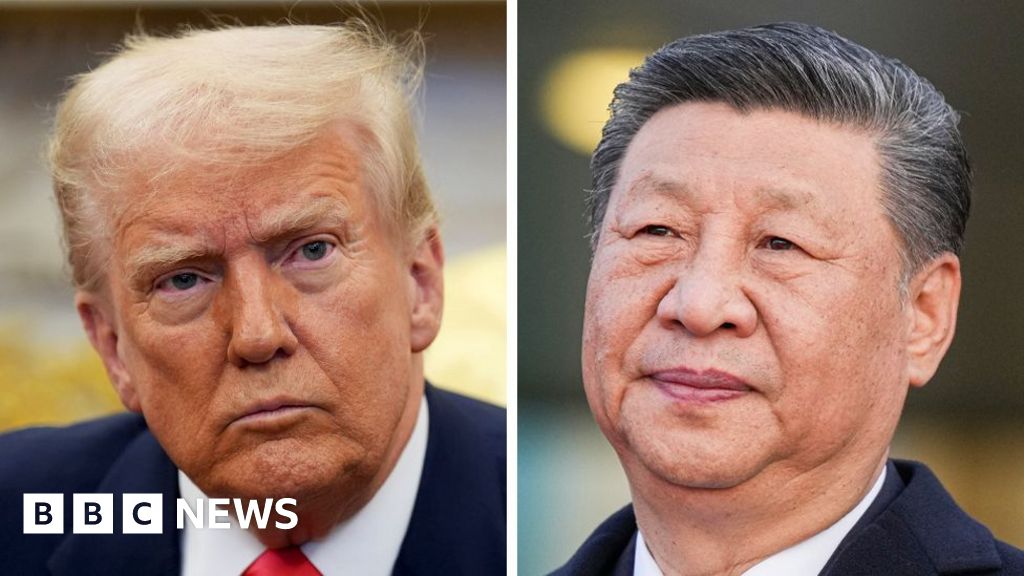US-China Trade Tensions: A Deep Dive into Recent Developments
Author: Jonathan Josephs, Business Reporter
In a rapidly evolving economic landscape, the trade relations between the United States and China have once again come under scrutiny. Recently, US President Donald Trump accused China of breaching a fresh agreement aimed at curbing tariff disputes. This claim sets the stage for an escalating back-and-forth that could significantly impact global markets.
The Tariff Truce
Just weeks ago, diplomatic talks in Geneva led to a temporary truce where both countries agreed to lower tit-for-tat tariffs. This arrangement was seen as a positive step toward easing tensions that have plagued US-China relations for years. However, the optimism was short-lived. Trump publicly expressed his disappointment, stating that China had “totally violated” the agreement, although he did not provide specific details regarding the alleged infractions.
The US Trade Representative, Jamieson Greer, echoed Trump’s sentiments, highlighting that China failed to eliminate non-tariff trade barriers they had committed to rolling back. This inconsistency raises questions about the viability of the agreement and the sincerity of both parties in adhering to terms.
China’s Response
In contrast, Beijing’s response was somewhat evasive. Instead of directly addressing the accusations, officials urged the US to "cease discriminatory restrictions against China." This exchange of heated statements suggests that both countries are far from resolving their differences.
The complicated nature of trade deals between these two economic giants often leads to a tit-for-tat cycle where each side leverages tariffs as a negotiating tool. These tariffs have significant ramifications not just for the immediate economies but globally, as they can affect supply chains, prices, and consumer behavior.
The Risks of Escalation
The tensions have drawn concern from various economic analysts. The prospect of renewed trade hostilities looms large as both governments seem unwilling to back down. Trump, in a social media post, claimed that the tariffs imposed during his administration had been “devastating” for China, suggesting that his strategy of aggressive tariffs was meant to drive negotiations in the US’s favor.
Interestingly, he framed his dealings with China as a way to mitigate a prospective "bad situation," but the fallout from his assertions reveals a complex reality. The expectation that complying with US demands would result in a less contentious relationship appears to be unraveling.
Countermeasures and Compliance
US Trade Representative Greer provided insight into the countermeasures implemented by China that followed the imposition of tariffs. Beyond the habitual retaliatory tariffs, China also placed restrictions on US companies, blacklisting certain firms and constraining exports of rare earth materials—vital to many technological sectors.
Greer’s remarks underscore the importance of compliance on both sides. The US continues to monitor China’s adherence to the deal closely, stressing that any slowdown in compliance is "completely unacceptable." The complex web of retaliatory measures highlights how intertwined the economies of both nations have become.
Diplomatic Communications
Despite the rising tensions, representatives from both nations have maintained dialogue. Following the Geneva talks, communications continued, albeit with a visible strain. US Treasury Secretary Scott Bessent indicated that discussions had reached a stalemate, which could hinder any future deals aimed at further reducing trade barriers.
Bessent anticipated that further talks would likely take place soon, possibly involving direct communication between Trump and Chinese President Xi Jinping. The notion of a "very good relationship" between the two leaders is seen as a hopeful factor, although it remains untested under the current pressures.
Legal and Political Implications
Complicating matters further are legal challenges to Trump’s tariff policies. A recent ruling suggested that the President may have overstepped his authority, a decision that temporarily jeopardized the administration’s tariff regime. Yet, the White House has filed for an appeal, restoring most tariff measures for now.
Trum’s assertion that foreign tariffs encourage American consumers to support domestic products also raises concerns about the long-term effectiveness of such strategies. The narrative of "America First" seems increasingly challenged as both domestic and international stakeholders react to the unfolding drama.
Future Trade Deals and Negotiations
Amid these tensions, trade discussions are not stagnant. A delegation from Japan, among others, continues to negotiate, casting the spotlight on the broader dynamics of international trade and diplomacy. Bessent mentioned that while some agreements are nearing conclusion, others are proving more complex, reflecting the challenges inherent in multi-nation trade discussions.
The implications of these negotiations reach far beyond bilateral relations. Analysts suggest that the uncertain legal framework of US tariffs may make other nations cautious in cementing trade deals, causing longer-term ramifications for US economic power.
Through intricate web of accusations, countermeasures, and legal hurdles, the US-China trade relationship remains under immense scrutiny as both nations navigate a complex landscape of diplomacy and economic strategy.


